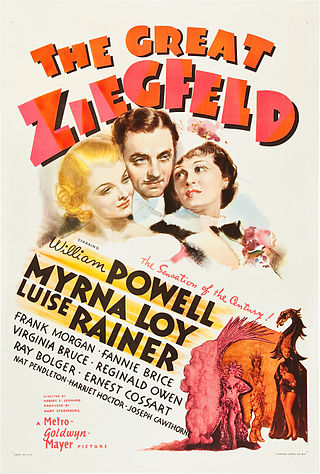
The Great Ziegfeld is a 1936 American musical drama film directed by Robert Z. Leonard and produced by Hunt Stromberg. It stars William Powell as the theatrical impresario Florenz "Flo" Ziegfeld Jr., Luise Rainer as Anna Held, and Myrna Loy as Billie Burke.
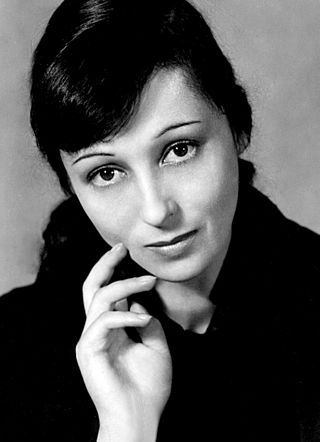
Luise Rainer was a German-born film actress. She was the first thespian to win multiple Academy Awards, and the first to win back-to-back; at the time of her death, thirteen days shy of her 105th birthday, she was the longest-lived Oscar recipient, a superlative that has not been exceeded, as of 2025.

Eleanor Torrey Powell was an American dancer and actress. Best remembered for her tap dance numbers in musical films in the 1930s and 1940s, she was one of Metro-Goldwyn-Mayer's top dancing stars during the Golden Age of Hollywood. Powell appeared in vaudeville, on Broadway, and most prominently, in a series of movie musical vehicles tailored especially to showcase her dance talents, including Born to Dance (1936), Broadway Melody of 1938 (1937), Rosalie (1937), and Broadway Melody of 1940 (1940). She retired from films in the mid-1940s but resurfaced for the occasional specialty dance scene in films such as Thousands Cheer. In the 1950s she hosted a Christian children's TV show and eventually headlined a successful nightclub act in Las Vegas. She died from cancer at 69. Powell is known as one of the most versatile and athletic female dancers of the Hollywood studio era.

Wilfred Van Norman Lucas was a Canadian American stage actor who found success in film as an actor, director, and screenwriter.
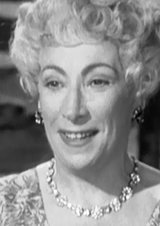
Martita Edith Hunt was an Argentine-born British theatre and film actress. She had a dominant stage presence and played a wide range of powerful characters. She is best remembered for her performance as Miss Havisham in David Lean's Great Expectations (1946).

An Ideal Husband is a 1999 British film based on the 1895 play An Ideal Husband by Oscar Wilde. The film stars Cate Blanchett, Minnie Driver, Rupert Everett, Julianne Moore and Jeremy Northam. It was directed by Oliver Parker.

Jean Dunlop Cadell was a Scottish character actress. Although her married name was Jean Dunlop Perceval-Clark she retained her maiden name in the context of acting.
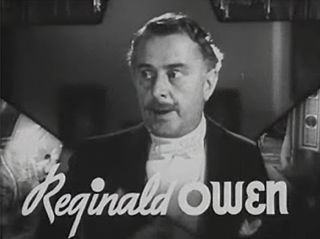
John Reginald Owen was a British actor, known for his many roles in British and American films and television programmes.

Adela Nora Rogers St. Johns was an American journalist, novelist, and screenwriter. She wrote a number of screenplays for silent movies, but is best remembered for her groundbreaking exploits as "The World's Greatest Girl Reporter" during the 1920s and 1930s and her celebrity interviews for Photoplay magazine.

Beau Geste is a 1926 American silent drama film directed by Herbert Brenon and based on the 1924 novel Beau Geste by P. C. Wren. Ronald Colman stars as the title character.

Mabel Van Buren was an American stage and screen actress.

Alison Skipworth was an English stage and screen actress.

The Three Musketeers is a 1948 film directed by George Sidney, written by Robert Ardrey, and starring Gene Kelly and Lana Turner. It is a Technicolor adventure film adaptation of the classic 1844 novel The Three Musketeers by Alexandre Dumas.

Ruth Donnelly was an American film and stage actress.

The Emperor's Candlesticks is a 1937 historical drama film starring William Powell and Luise Rainer and directed by George Fitzmaurice. It is based on the 1899 novel of the same name by Baroness Orczy. The story follows the adventures of spies from opposing sides who fall in love while following the eponymous candlesticks—and the papers hidden inside them—all over turn-of-the-20th-century Europe.

The Good Fairy is a 1935 romantic comedy film written by Preston Sturges, based on the 1930 play A jó tündér by Ferenc Molnár as translated and adapted by Jane Hinton, which was produced on Broadway in 1931. The film was directed by William Wyler and stars Margaret Sullavan, Herbert Marshall, Frank Morgan and Reginald Owen.

Georgiana Caine was an American actress who performed both on Broadway and in more than 80 films in her 51-year career.

Leopoldine Konstantin was an Austrian actress. She played in Frank Wedekind's Spring Awakening (1907), Shakespeare's Romeo and Juliet (1907), A Winter's Tale (1908), and A Midsummer Night's Dream (1910).
Maskerade, is an Austrian operetta film, and a classic of German language cinema. The exceptional script of this, a great example of the genre of the Wiener Film, was by Walter Reisch and Willi Forst, who also directed. The German premiere was held in Berlin on 21 August 1934, followed by the Austrian premiere in Vienna on 26 September of the same year.
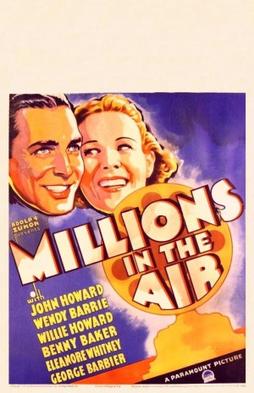
Millions in the Air is a 1935 American comedy film directed by Ray McCarey and written by Sig Herzig and Jane Storm. The film stars John Howard, Wendy Barrie, Willie Howard, George Barbier, Benny Baker, Eleanore Whitney and Robert Cummings. The film was released on December 12, 1935, by Paramount Pictures.



















